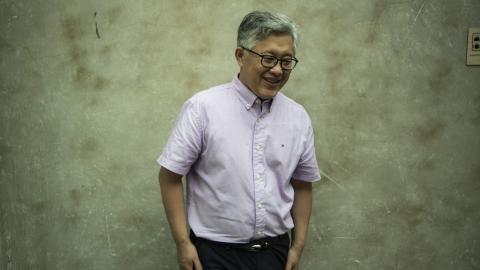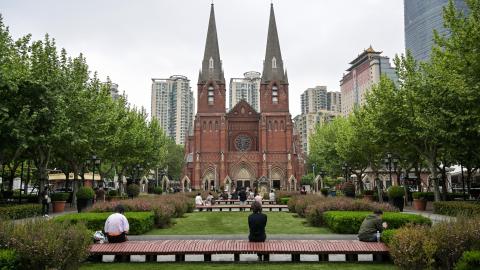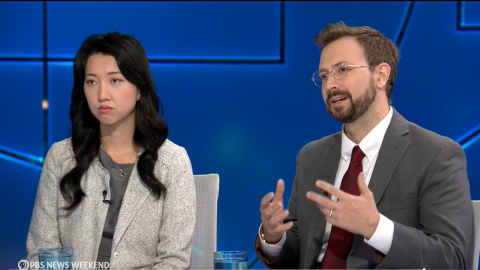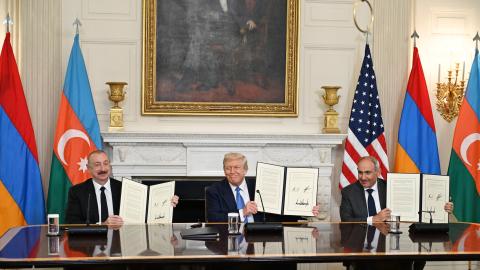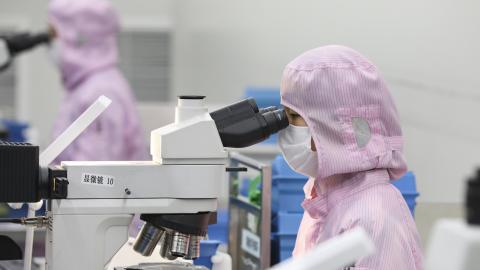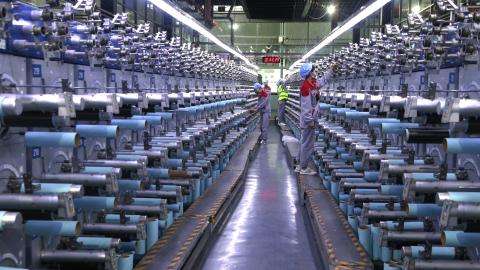
Prioritizing the Release of Chinese Christian Pastor Ezra Jin Mingri

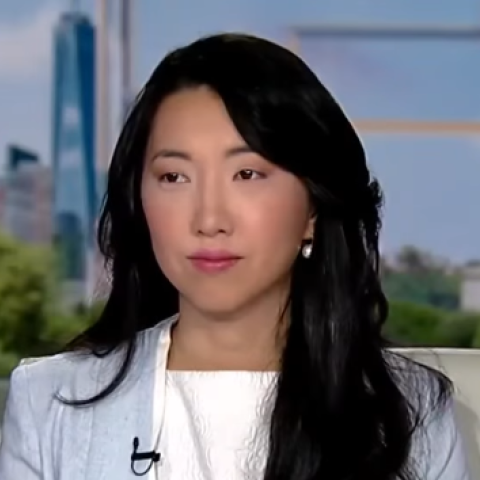
Daughter of Pastor Ezra Jin Mingri
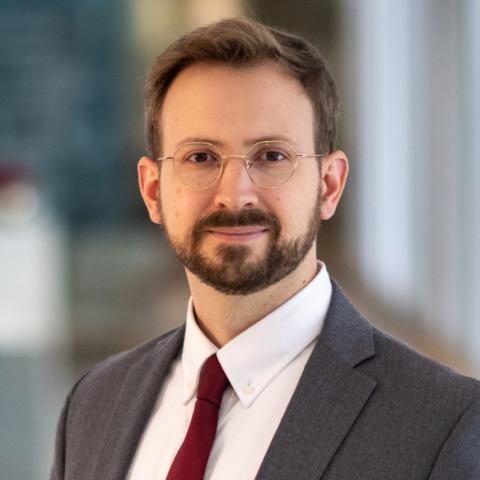
Hudson Fellow and Son-in-Law of Pastor Ezra Jin Mingri
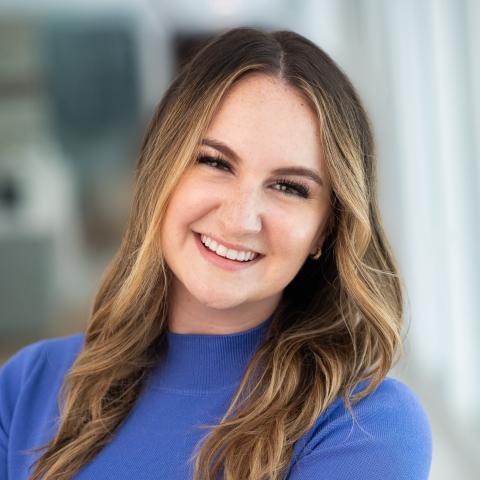
Senior Fellow
Olivia Enos is a senior fellow at Hudson Institute. She specializes in human rights and national security challenges in Asia.
On October 10, Chinese Communist Party authorities handcuffed and detained the lead pastor of Zion Church, Ezra Jin Mingri, beginning China’s largest crackdown against a single house church in over 40 years. Party officials also detained or disappeared an estimated 30 other pastors and associates of Zion Church.
Days earlier, the CCP escalated its rhetoric in the ongoing trade war between the United States and China. Beijing often demands that other nations remain silent about its human rights record as part of negotiations. But Pastor Jin’s arrest is a reminder of the human cost of acquiescence to that demand.
Join Hudson for a conversation with Pastor Jin’s daughter and son-in-law about Pastor Jin, why he and the other detained Zion Church members matter for US foreign policy, and what the US government can do to secure the church members’ release.
Senator Ted Cruz (R-TX) and Representatives Young Kim (R-CA), John Moolenaar (R-MI), and Jim McGovern (D-MA) will provide virtual remarks.
Event Transcript
This transcription is automatically generated and edited lightly for accuracy. Please excuse any errors.
Olivia Enos:
Hi everyone and welcome to Hudson Institute today. I’m Olivia Enos, a senior fellow here and it is my privilege to be able to host this event today. I know that many of us wish that we were meeting under different circumstances, that Pastor Jin and other associates and pastors of Zion Church were free, but unfortunately they are not. And so we really wish that the CCP had never made this decision to detain Pastor Jin. And let’s be clear, Pastor Jin and his other associates committed no crimes. They worshiped Jesus, they shared the gospel both in person and online. Some of their online prayer gatherings even attracted as many as 10,000 people. Many souls have been saved because of Pastor Jin’s selfless service and determination to bring people to Christ.
In other words, Pastor Jin and the members of Zion Church were exercising their right to religious freedom. But this is not tolerated by the Party. Like most Christians targeted by the CCP, Pastor Jin is charged with fabricated crimes. In this case for disseminating illegal information online, a crime under Chinese law. At this point in time, he has been charged, but he has not yet been sentenced. And that presents an incredible opportunity here. Not only is Pastor Jin not charged, his entire nuclear family is based here in the US. And his two sons and his daughter, Grace, who we’re honored to have here today, are American citizens. This makes his case a priority case for the US government. That is why we are calling for his unequivocal and immediate safe return into the care of his family here in the US. And we need others in the US government to be bold and to speak up in defense of Pastor Jin and others who are detained.
It’s important to note that Pastor Jin’s detention is happening amidst a swirl of geopolitical ongoings. As we speak, the US and China are in the midst of an ongoing trade war. And just two days prior to Pastor Jin being taken, the CCP threatened a near total export ban on rare earth minerals, a statement that they have since walked back. A threat was issued. And after the threat was issued by the CCP, President Trump suggested that the planned meeting between XI and Trump on the sidelines of APEC, which is slated to happen next week, might be hanging in the lurch.
Although that meeting is still on, the CCP likely does not want to have a diplomatic route over Pastor Jin’s detention, and that is a real risk. This makes the time between now and the start of the APEC meetings absolutely critical. Getting Pastor Jin released prior to his sentencing is far easier than it is after. And given the APEC meeting’s next week, there is leverage to up the ante on the CCP. To warn them that if they continue to detain Pastor Jin and others from Zion Church, they risk creating a diplomatic route ahead of, as well as on the sidelines of, APEC.
We hope that this event today here at Hudson and the many incredible advocacy efforts that Bill and Grace have been involved in over the past . . . Over 10 days. It’s been two weeks now, since his detention. That this rallies attention from officials in the US government and from, frankly speaking, officials from all over the globe. Ideally, the administration would even condition their meeting at APEC on the release of Pastor Jin and other associates of Zion, perhaps even requesting the release of other high priority political prisoners that the CCP is unjustly detaining. Whenever a person is detained, I think it can be easy to feel hopeless and helpless. But looking for leverage and looking for the means that the US government has at its disposal, I want to offer encouragement that there’s many, many options for action.
I think we’re already incredibly grateful for the outspokenness of the US government. The State Department has unequivocally condemned Pastor Jin’s detention. And not just condemned it, but asked for his release and for his safe return to the US and to his family, which is really important. Secretary of State Rubio has even tweeted on this. There’s been high level attention from other government officials. The Congressional Executive Commission on China even sent a letter just yesterday to President Trump calling for his release as well as the release of other high priority political prisoners. And then there was also a resolution issued yesterday by Senator Ted Cruz condemning the CCP’s taking of your dad and father-in-law. And I think for that, we’re incredibly grateful. We’re even going to hear from a few members who are offering their support here today.
But I wanted to highlight a few areas of action that can be taken now so we can be thinking practically about the next steps. First, individuals at the highest levels of the US government must continue to call for Pastor Jin’s release. Second, the president should condition future diplomatic engagement between the US and China on the release of high priority political prisoners like Pastor Jin. Third, members of Congress should consider adopting Pastor Jin as a political prisoner, thereby committing to champion his cause at the highest levels of government. Fourth, Pastor Jin should be designated as a religious prisoner of conscience by the US Commission on International Religious Freedom, and ideally, his case should be adopted by a commissioner. And fifth, the US should consider elevating political prisoner advocacy at the highest levels of State Department by creating an Office of Political Prisoner Advocacy.
Today, we’re so blessed, truly, to have both Grace and Bill joining us here on the stage. As many of you know, Grace Jin Drexel is the daughter of Pastor Jin and Bill is the son-in-law as well as my Hudson colleague. These two individuals are truly a force to be reckoned with and are so incredibly brave. I think you guys have just truly demonstrated bravery in the face of some of the most difficult circumstances. And I think you are just greatly to be admired for that and for everything that you’re doing. Your dad is so proud of you, Grace, and loves you very much.
I’m looking forward to hearing from both of them about Pastor Jin’s case, why he and others at Zion Church matter for US foreign policy, and what the US can do to ensure Pastor Jin’s freedom. But before we turn to them, we are so grateful because so many in Congress are standing up and speaking out on behalf of Pastor Jin. And we’re really blessed to be able to hear from some of those folks today, including in-person. So I’m going to invite Piero Tozzi to come up. He’s from the Congressional Executive Commission on China. And he’s going to be offering a statement of support from Representative Chris Smith. So thank you, Piero.
Piero Tozzi:
Sure. Well, thank you, Olivia, and thank you all for being here. And, of course, Grace and Bill. Mr. Smith unfortunately could not be here, but he did ask that I read a statement from him. And then I’ll just add a few words since Grace you know you’re so close to my heart as well. This is, again, speaking for Mr. Smith. “I was sickened, but not surprised to learn that the other week, the Chinese Communist Party launched its largest crackdown on Protestant house church movement in decades, rounding up dozens of faithful Christian pastors and members of Beijing Zion Church, merely for practicing their faith. Those arrested include Pastor Ezra Mingri Jin, who had been cruelly exit banned and kept from his family who are US citizens since 2018.
Xi Jinping clearly will not tolerate worship of anyone other than himself. He sees Chinese Christians as a threat to his rule precisely because of Christianity’s fundamental commitment to a transcendent God in whose likeness we are all created. The CCP cannot silence the witness of these brave men and women from Zion Church. We must stand with them and with their families against the totalitarianism of the CCP, which remains the greatest threat to religious freedom in the world today.
My wife and I are praying for Pastor Jin, for the faithful of Zion Church, unjustly held in Chinese detention and for their families, as well as an end to Xi Jinping’s unconscionable and unrelenting war on religion. I also want to add, Grace, that my wife and I are praying for you and for your family as well. And you are very close to our heart at the CECC. You worked with us and it’s something that . . . We’ve put your father in our . . . As one of our political prisoners that we’ve identified. And just . . . I think it was, well, yesterday, we wrote a letter to the president, Mr. Smith and Mr. Sullivan, the co-chairs joined by Chairman Moolenaar from the Select Committee. We included your dad as well as other Americans who are unjustly detained. And we will continue to fight with you and support you. And thank you, Bill, for being such a great support to your wife. And Olivia too for everything. And thank you all for coming and caring. Thank you.
Olivia Enos:
Well, thank you so much, Piero, and thank you to Representative Smith and all the work of the CECC to elevate this case and to . . . For so much of the work that you do on human rights issues in China generally. We now have several video statements of support from senators and representatives that we are just really honored to have. It’s wonderful that they’re willing to speak so publicly about this. So first, we’re going to hear from Senator Ted Cruz. And then we’re going to hear statements from Representative Moolenaar, Representative Kim and Representative McGovern. And it is so wonderful to have bipartisan support for your dad’s case. I think people realize how important this is. So I’m going to turn it now over to start Senator Cruz’s video.
Senator Ted Cruz:
For years, Christians around the world have faced persecution. In China, Christians fight daily for their religious freedom against the Chinese Communist Party. Just a few weeks ago, the CCP arrested Pastor Ezra Jin Mingri and many other pastors and church members simply for worshiping and attending church. Pastor Jin’s church, Zion Church, is one of China’s largest independent house church congregations and has faced years and years of harassment. Now he’s been taken from his family, three of whom are American citizens living here in the United States, including his daughter Grace, whom many of you know. That’s why I’ve introduced a bipartisan Senate resolution calling for Pastor Jin’s immediate release. We must make it clear to the CCP that the persecution of Christians and other people of faith must stop. And that the United States will use every tool, diplomatic and economic, to hold Chinese communist officials accountable.
Religious freedom is a fundamental human right given to all of us by God, and we must continue protecting Christians around the world from religious persecution. History shows us that you cannot extinguish faith by force, and the CCP’s efforts are no different. They are doomed to fail. To Pastor Jin’s family, you are not forgotten. We will keep fighting until Pastor Jin is free. May God bless Pastor Jin. May God bless his family. And may God continue to bless the United States of America.
Representative Moolenaar:
Hi, Bill and Grace and my friends at the Hudson Institute. It was great being with you the other day. I’m thinking about your father, Grace. He would be so proud of you for your courage and the way you’re speaking out. And I was honored to have met with you and talked with you about his situation. Please know that myself and our committee, we will continue to advocate for freedom and for . . . Just pray that he is released and that his needs are met. I know you’re concerned about his health concerns. And I just want you to know we are advocating and we are praying for you and your entire family.
Congresswoman Young Kim:
Hello, everyone. I’m Congresswoman Young Kim representing California’s 40th District. I want to thank the Hudson Institute for hosting this important event and for inviting me to give remarks. Grace and Bill, your courage in sharing your father and father-in-law’s story gives strength to all of us who believe that faith and freedom are worth defending. It’s inspiring to see so many leaders and people of faith speaking out on behalf of Pastor Jin and other victims of religious persecution. And as you gather together this morning, you are all united by compassion, conviction, and a shared belief that standing up for freedom isn’t just an ideal, it’s a calling that changes lives.
Pastor Ezra Jin is a man of peace, a husband, father, and leader who has spent his life helping others find hope. His only so called crime is leading one of China’s largest house churches and refusing to let the Chinese Communist Party decide how he and his congregation worship. For that, he has been separated from his family since 2018 and was recently detained with nearly 30 other church leaders. As a mother and grandmother, I can only imagine the pain of knowing your loved one is unjustly imprisoned simply for speaking and fighting for the truth peacefully and in love.
And as someone who grew up in South Korea in the aftermath of the Korean War, I know that freedom is not free and can never be taken for granted. Under President Trump and Secretary Rubio’s leadership, the United States has made its position very clear. People of faith must be able to worship with our fear here at home and around the world. I will continue working across the aisle through every diplomatic and humanitarian channel available to fight for Pastor Jin’s release. We must remember that no regime, no law, and no prison can silence the truth that every person is born with the right to believe freely.
So to Grace and Bill, please know that we are with you and your family. We stand with you and we will continue speaking out, praying and pressing for Pastor Jin’s release. Faith is stronger than fear. Together, Americans and freedom-loving people everywhere will keep working to hold authoritarian regimes accountable and build a freer and safer world for our children, grandchildren, and future generations. Thank you.
Representative McGovern:
I want to thank the Hudson Institute for hosting this event on Pastor Ezra Jin. As you all know, he, along with members of the Zion Church, we’re rounded up. Members all over China. The people of China have a right to religious freedom and we need to speak out loudly against attacks on religious freedom. President Trump is meeting with President Xi next week. And we urge him to raise the issue of Pastor Jin. And we want him to raise it forcefully and to restate US policy that we are committed to the freedom and the rights of every individual. And every individual’s human rights need to be respected, including the right to religious freedom. Thank you.
Olivia Enos:
Well, we’re incredibly grateful for these statements of support and very grateful that Congress has turned their attention to this issue so rapidly. Now I’m going to turn to the main event, which is to be able to talk with you, Grace, and to talk with you, Bill. So Grace, I know that there’s a video that you’d like to play, so I’d like to invite you to go to the podium now.
Grace Jin Drexel:
Thank you so much for everyone for being here. I see so many friends seated. I was joking that it kind of feels like a Christmas party, but obviously in a very different mood. But very grateful for all the support that we’ve been getting from this administration, from members of Congress on both side of the aisle, and we’re extremely, extremely grateful, and thank you for you all being here and paying attention to my father. My father started Zion Church in 2007, and it has grown to become one of the largest churches in Beijing until it was shut down in 2018. And around then we were hosting up to 1,500 members each week. And when it shut down, the Lord has really used even the persecution itself and helped Zion actually, instead of dwindling, grow to become a national church now reaching up to 10,000 people daily.
And I wanted to show a little bit of a video of the church. It’s like one . . . It’s a five-minute video of . . . Maybe some of the non-denominational folks can kind of recognize this format of just a countdown video. And I think it will do a good job of just showing what the church is about and helping you see the faces and helping you remember the names and faces of these people. Just . . . I will try to comment a little bit as well. But I want to know that these are the people who are just being imprisoned for their faith and my father as well as 22 other pastors. And many of the church congregants are the ones who are being detained again just for worshiping like this. And we’ve been model citizens. We’ve wanted to . . . In some of these images too, we’ve serve our communities, we serve the people. We would . . . We want to live out biblical truth and biblical like-
Grace Jin Drexel:
. . . biblical truth and biblical lives. We want to spread the gospel and live the words of Christ. So, we also can see that we also try to dialogue with other minority groups in China and all of these things as well. We also host just missions or events, and you can see how the church is actually quite patriotic. We are proud to be Chinese. We want to send more missionaries from China out into the world.
Pastor Long is now one of our pastors and who is leading Zion Church out in exile. He was studying at Wheaton and his doctorate and has now taken up as an interim pastor to lead the Zion Church while the 23 pastors and leaders are all being detained. This is our Christmas event and you can see just lots of singing and worship in general. And this is an event just to donate blood, a blood drive and we hosted it at our church as well when we still had our church building in Zion.
This was the 2018 shutdown. You can see that the police really took control of the whole building, and this is one of our ministers who was taking a photo with the police guard who were . . . These were some of the pictures of those that were detained and people praying for them in front of the detention center. They tore down the signs and everything. They’ve locked everything up and would not let anyone in.
And at the same time though, I think my father was always just optimistic in the Lord that he will be able to use any of the situations. So, even in those times, he trusted the Lord. And this was the aftermath of after the shutdown, the church was able to gather a year later just to gather everyone together just to see how everyone is and things like that. So, yeah.
Yeah. Ultimately, yes. Again, I just wanted to show this video, so that you remember these people, remember their names. Please speak out on Zion and my father, Pastor Jin Mingri, Ezra Jin. And yes, thank you so much.
Olivia Enos:
I’ll just say really quick, I think it is so wonderful, Grace, that you are sharing about, of course your dad, but about the work of Zion Church generally. And I know it was really Grace’s heart wanting to show this video, so that we could see the real people who are affected by this day by day. And I think having that visual is so incredibly helpful for us to be able to connect with the case on a very personal level.
I also just wanted to add, and I know, Bill, you’re going to touch on some of this a bit, but 2018 was a crackdown that occurred and it didn’t just affect Zion Church, it affected others. Pastor Wang Yi was detained at that time in Early Rain Covenant Church. Several members were detained at that time. And I think this demonstrates a longstanding pattern of the CCP targeting Christians, targeting people of faith. And I just wanted to highlight that that was the case and that your father was incredibly brave because he returned, even after the crackdown, to continue to lead the church, to lead Zion. And his bravery is just so greatly to be commended.
So, yeah, I’ll leave it at that. I know, Bill, you’re going to talk about some of the roots of different challenges, so looking forward to hearing from you as well.
Bill Drexel:
Thank you, Olivia, and thank you Hudson. I just want to say that upfront that Hudson’s been incredibly supportive since day one. We’ve been so, so thankful for everything Hudson’s been doing, everything Olivia’s been doing, Michael as well in the audience, and so many others at so many levels.
Yeah, I want to zoom out and talk about that pattern. So, we can talk about, to use the Chinese word, historical dialectics. So, I want to discuss why is there pattern? And what does it look like between China having these crackdowns and then the church, how it responds and why it’s ultimately counterproductive even for the CCP’s own goals? I also just want to preface that actually most people don’t realize this, but in some ways my relationship with Grace’s father actually predates my relationship with Grace.
So, in 2018, I was in grad school at Tsinghua University doing this Schwarzman scholarship. And as far as the university was concerned, I was studying Chinese concepts of privacy. In actual fact, I was trying to study Chinese state surveillance of religious minorities. Most of that was spent on urban Protestants, but also I spent a considerable amount of time working on the Uyghur issue, which was also really kicking off in the public media a lot at that time. And it was really right after I arrived in Beijing that Zion Church was forcibly dismantled. The straw on the camel’s back, at least ostensibly, was that the state asked that the church would allow it to put facial recognition cameras in the sanctuary. Grace’s father, my father-in-law, refused, and then they came for them.
I spent months trying to track down that church. It was very difficult at the beginning. But near the end of my time in China, I met Grace. To be very clear, I did not know that the pastor of the church had a beautiful and eligible daughter at the time. And in fact, I didn’t even know that Grace was his daughter when we first started talking. And we hit it off and it just goes to show that sometimes your graduate school work becomes very personal.
So, what I’m about to say blends the research that I did way back then, seven years ago, and everything I’ve learned up until now. But my sense is there are a lot of reasons why the Chinese Communist Party does this to churches. And I’ll say that this is more specific to the underground church in particular. There’s a lot of really brutal, really vicious religious repression across China to many groups. I’m focused more on this at the moment, but I think there are three main reasons.
The first one is that the Chinese state, the communist government hates any kind of civil society network. So, Sun Yat-sen once said that, “The Chinese nation is like a great heap of sand, millions of grains completely disconnected from one another.” And to a degree, at least in the way that the CCP treats it, that’s by design. They want society to be isolated, broken down, uniform, and therefore, easily ruleable. So, anytime they see the sand, to extend the metaphor, getting clumpy, they want to crush it. Again, they just want this uniform, unassociated, easily-ruleable, unpackable millions of grains of sand that they can rule over. And so, as a result, the church in China has grown considerably and it continues to grow. And they see these structures, these civil society structures, outside of state control and it makes them nervous.
Just to take another example, if we go way back, there’s a book of Chinese statecraft called, I believe it’s The Book of Lord Shang from the fourth-century BC. And he has this adage, he says, “When society is weak, the state is strong. And when society is strong, the state is weak. Therefore, the government that follows the way works to make society weak.”
Now, to be very clear, I think Hong Kong and Taiwan have shown that democracy absolutely flourishes in a Chinese context. But in terms of the traditions of governance that the CCP draws upon, it is that tradition. It’s that tradition of when society is weak, the state is strong, and when society is strong, the state is weak. Therefore, work to weaken society. And so, to the extent that underground churches represent a civil society intrinsically, they see that as an issue.
The second reason, which stems from the first, is that they see what happened, especially in Poland and other places in the Soviet Union, in terms of the role of the church acting as a vehicle for public discontent. And so, they’re very concerned about particularly any association being able to act as a beachhead for public discontent. Now, the irony here is that, as Grace has mentioned, the members of Zion Church and largely these churches in general are patriotic. They want to serve their people. They want to serve their society. They’re proud of being Chinese. And in fact, they’re proud of being an independent church on their own terms in their own country.
So, there is this irony about it, but that’s really one of the key drivers here is that, to my mind, there’s not much of a coincidence that this first crackdown in 2018 occurred in the middle of trade war one, and that this is really drumming up in advance of a fear of trade war two. So, they see economic trouble on the horizon, they see storm clouds brewing, and their response is to try to batten down the hatches of society and shut down anything that they think, from their authoritarian paranoia, could lead to public discontent or facilitate it.
And the last reason is that . . . We always joke often in China-watcher communities that they’re not actually communist anymore. And in an obvious sense, that’s true. But they do care about the ideology and especially it seems to be the case that Xi Jinping cares about ideology. And I think that there is this discomfort with this intrinsic threat that here’s another worldview that so many find so appealing and that it is such a powerful motivator to serve the society.
So, to take one example, there was an earthquake in, I think 2008 in Sichuan, and it was the underground churches that were there, in many cases, first, in greatest force, to serve the community before the state. And this was deeply offensive to a authoritarian government that has this ideology that they want to be a unifying force for their people. So, they feel threatened and they’re concerned about groups that bring people together and tighten a community to value truth, to value character, to value service that are outside of the official party line.
Now, I think the irony with these three reasons I’ve laid out is that crackdowns like these actually are counterproductive, I think on all three fronts. So, I mean this is not new. Really since the time of Mao, the Chinese government has tried to smother the church and has failed, and consistently, the church has grown. One reason for that, to go back to the networks thing. This has always been the historical pattern, not just in China, but around the world, that when the church is repressed, it tends to create an explosion of that network. And so, we saw this very clearly in the 2018 instance.
It was so ironically, and it’s really a case study, when the state demanded that they abandon their physical space, this forced the church to develop this hybrid online, offline decentralized model. And when COVID hit and there were these severe restrictions on associating, and so many people went back to their hometowns, the church already had this hybrid model that offered a sense of connection, a sense of community, and a sense of hope at a time when all those things were lacking in society. And that’s a huge reason why it exploded so dramatically and became a nationwide church. Again, from this service mindset, trying to meet the needs of the people where they are.
Obviously, this is a major escalation that we’re seeing right now. 22 others in addition to Grace’s father in prison in a full decapitation attempt. But honestly, we’re optimistic at least about the future of the church. We don’t know how, but the model is clear that the church continues to grow.
Second, you talk about the beachhead thing. Again, we just emphasize this church, all it’s been trying to do is serve society. And a way to stoke discontent, a way to try to create beachheads, not necessarily in the church, but in general, is to imprison those who are trying to serve society for unreasonable reasons. And the last one to do with the competitive ideology fear that the government has, I think this is maybe the most obvious of all. In imprisoning and enforcing those individuals and families to suffer for their faith against the backdrop of a government that is acting out of this insecurity for their own rule, that makes very public, it surfaces the strength and the vitality of the worldview that these Christians defend. And as a result, it’s actually more attractive in the long-term.
I think I’ll leave it there, but I just want to say that we are so thankful, again, for all the support. We pray and we hope that the Chinese government will have a change of heart on this. And we thank the US government and the media and Hudson Institute, so many people who have been so much more supportive than we could have ever imagined. So, thank you again.
Olivia Enos:
Thank you. Well, thank you for that really comprehensive overview of some of the drivers of the CCP’s actions. I was really struck when you were mentioning how in the Soviet and post-Soviet context, so much of the movements against communist leaders were very peaceful, faith-led movements. And the CCP, yes, does see that type of a movement as a threat. But I’m reminded of something that our pastor at our church at Redemption Hill often says, and he says, “It doesn’t matter who is in power, it doesn’t matter who’s trying to threaten, it doesn’t matter at all. Victory has already been won and the Gospel cannot be threatened no matter what.” And I think that is such a encouragement at this time, even in the midst of your dad and your father-in-law’s suffering. So, I really appreciate you sharing that.
I’m going to take moderator’s prerogative. I was originally going to only ask one question, but I’ve thought of a second one that I also want to ask. But meanwhile, that will give all of you time to think through questions. As you are thinking through your question, we’ll have somebody going around with a microphone. Please identify who you are and who you’re with, and please ask a question, because if you don’t ask a question, I will stop you. No dialogues.
Olivia Enos:
My first question though to you, Bill, and to you, Grace, is if there was one thing that the US government, whether it’s the executive branch or Congress could be doing today to help get your father free, what would that be and why? Grace.
Grace Jin Drexel:
Thank you so much for the question. What we’ve seen just repeatedly through other cases, and even just seeing this case, is that the more you are forgotten, the actual worse treatment that you get in China. So in all levels of government and civil society, the more you mention my father’s name, just even what’s going on there, give us an update, can we visit? That’s all incredible, incredible gestures of mentioning that they’re not being forgotten and that they are important to the global community. Yeah, so that’s something that, yeah.
Olivia Enos:
Okay. Yeah, and Bill?
Bill Drexel:
Yeah, I’d just add to that. I think we were so grateful and it was an incredible boost that Secretary Rubio came out publicly to support my father-in-law so quickly. The best thing we can do is keep that up. If there could be a signal from either the vice president or the president, that would go a very long way. And the other thing we’re really hoping for is that the case of these 23 imprisoned Zion Church members would be a precondition of becoming talks, that it would be a serious ask that the Chinese government can’t take people hostage like this in advance of trade talks.
Olivia Enos:
Yeah, I mean, I think it’s also just a really good reminder to our audience members that it is a privilege for heads of state to meet. So Xi and Trump meeting, it’s not a given. And so I think it’s very reasonable to have preconditions and to ask for signs of good faith from Xi and from the CCP. And I think given that they have created this diplomatic incident, calling them on the carpet for it both prior to, and if the meeting does go forward in the midst of will be incredibly important. I wanted to ask one other question, and it’s a little bit more of a personal one. I’m looking around this room and so many of the folks that are in this room are personal friends, I think of all of ours. How can we personally be supporting you guys in the midst of this time? Because is not an easy circumstance to be in.
Grace Jin Drexel:
Thank you so much for that question too. And I just wanted to also use this opportunity to personally thank all those that have helped and those who have been our advocates, regardless of whether we knew or not. We were having calls with people and they were saying, “Yes, three people have called us on this issue.” We’re like, we don’t even know who those three people are, but just so thankful for the community here immediately after we had a meal train in our neighborhood and all of these things. I’ve been living in a daze for the last two weeks and just, I’ve not taken my kid to school since last Friday, and a neighbor has stepped up and has driven my kid to school every day. And all of these things are just, very, very thankful for everyone’s support. And it really truly does take a village. And again, just so thankful that everyone has been so supportive of us and in a very difficult time for our family that I know that we’re not doing this alone. So thank you.
Bill Drexel:
Yeah. I’ll just add too that it’s kind of the opposite of that quote I shared about when society is weak, the state is strong. Our tradition is that when society is strong, the state is strong, we’re all stronger together. And I think the response to what we’ve been going through has been a real case in point. I mean, our society is very lumpy in the best of ways. Our church immediately it came to our aid. Our neighbor, some neighbor, I mean, we got a call from a neighbor we hadn’t talked to in half a year, and he calls and says, and I guess I didn’t even know he had these connections, but he said, “I called this person, I called this person, I called this person.”
I mean, the people who have come out of the woodworks around us at work, in our neighborhood, at our church and beyond has just been really overwhelming. And so we’re thankful. Honestly, I feel like it’d be hard for anyone to be doing anymore, and we’re just overwhelmed with that love and it makes us proud to be where we are. And so thankful to everyone. We’re always, I mean, the thing that we can never get enough of is prayer, but you should know that when you pray with us, we tend to lose it. So not in public events.
Olivia Enos:
Oh, man. Well, we’re happy to open it up to questions for folks if anybody has questions for Grace and for Bill. Anybody? Oh, yes, Henry.
Henry Song:
Hi. Henry Song from One Korea Network. Olivia and Hudson, thank you for putting on this very important and timely event, and Grace and Bill, thank you for your courage in this fight for your father’s freedom and justice. I’ve noticed that some minor Christian online outlets in South Korea have reported on your father’s case, but not the major mainstream media in South Korea. These are mostly Christian publications, so my question is, how can the church in Korea and also the Korean American church community here in the US and North America and beyond can support you guys and then also plead for your father’s case, is my question. Thank you.
Olivia Enos:
And I just wanted to add here for context too, because I don’t know that any of us have said this at the outset, but Pastor Jin is Korean-Chinese, and so there are some additional elements, potentially ways that the Korean government could maybe even be involved, Korean society, Korean churches, in addition to the Chinese churches and community.
Grace Jin Drexel:
Thank you, Henry, for that question and for the clarification. Yes, my whole family is Korean-Chinese. Ethnically, we are Korean, but we were born, my parents were born in China and I were born in China. In some of the videos, you might have noticed some Korean on the background as well. We always had a Korean service. We started with, my father started as a Korean minister in a Three-Self church. That’s a government-sanctioned church. And that also goes to show that he knows what a government-sanctioned church is like and how difficult it is to actually truly minister to people there, that it is really a church in captivity. And I’m happy to go more into it in the future. But I think in terms of community, we ask and pray for the global church to pray with us, but especially because we have the Korean connection, we do just hope and pray that the churches in Korea don’t forget about us and especially your fellow Koreans in China.
Don’t forget, several other pastors that are in Zion Church are also Korean-Chinese. So just don’t forget us, that we are all worshiping the same God ultimately, and God doesn’t see borders. But at the same time, there is something that connects us that is deeper. And so we hope that there will be more attention on us during this time, especially we know that the APAC Summit is going to be hosted in South Korea, and so for the Korean churches to raise up in prayer, as we know, the Korean churches are really good at praying, so we really, really ask for really strong prayers from Korean churches. Thank you.
Olivia Enos:
Did you want to add anything, or?
Bill Drexel:
Well, the only thing I’ll add, there’s a huge role for Korea here given the kind of Korean ethnic angle. But also the other thing we’ve been saying is even beyond Korea, it’s a global church issue. One thing I’ve noticed is that China is trying to lead the global south with its Belt and Road Initiative and BRICS, and it hasn’t seemed to occur to them yet that a lot of these countries that they really want to have these improved relations with are very Christian and even within the same kind of theological school of Zion Church. So we also were really calling on churches across the global south to join with us in solidarity as well, and to make clear that the shared future for mankind that China is trying to promote to these countries can’t include criminalization of faith and conscience.
Olivia Enos:
That’s great. Tom, I think I saw your hand over here.
Tom Duesterberg :
All right, Tom Duesterberg, also here at Hudson. I have a related question to the last one. In the battle against the Soviet Empire, Pope John was very influential, and we’re here in Washington, we think about getting political leaders to weigh in on these things. But other faith traditions besides Protestantism could be a help, I think. How can we try to motivate the Catholics, the Dalai Lama, others to get involved? And as Bill just said, religious freedom is a global issue.
Olivia Enos:
Well, I’m happy to just weigh in here. I mean, I think one of the things that’s very rewarding about doing the work in the China space in general is how the movement often cross-pollinates, how we’re able to stand hand-in-hand with other Hong Kongers, many of whom are Catholic. Like Jimmy Lai, for example, is detained. And then you’ve got Uyghurs, you’ve got Gulshan Abbas or Ilham Tohti and others who are detained and other Christians who are detained. And so Tom, maybe you’re giving us an idea for another event here at Hudson where we can all kind of stand in solidarity to press for this. But I think there are so many ways and communities and individuals that we should be thinking about engaging who share common cause, because the CCP just views religion of any sort as a threat. And so that means that regardless of faith tradition, people should feel very confident in taking a stand against Pastor Jin’s detention, whether it’s a shared faith or coming from another faith community. Did you all want to add?
Grace Jin Drexel:
I just wanted to add that for, I also agree that ultimately I think that this is all a common tactic of just trying to control your ideology, control God in some sense. And for Christians, we see this as not a new thing. In the Old Testament, Pharaoh. In the Old Testament, King of Babylon. In the New Testament, and we see the early church, Rome. These are again and again, leaders who think they are God, they can put God in its place under them. That is not what the true church or true Christian believes. We believe that Christ is the center and Christ is the head of church, and that’s all that we want.
And I really urge the global church, other faith leaders as well to recognize that that is what we are striving and asking for, to put Christ in the center of our churches and let Christ be the lead alone and not Christ being the center as long as he gets approval. And that’s the model of the state-sanctioned churches that they want to put you under with other faith as well. And we want to urge everyone to recognize that and to stand with those that are persecuted solely for their freedom to believe in Christ or believe in whatever religion.
Bill Drexel:
And I think I’d also like to add, I love this question because you’re right that in the Soviet era, this was a major factor. What’s been interesting to me is it feels to me like the structures we have to kind of address these issues in many cases are actually stuck in the Soviet era. The CCP’s playbook has evolved tremendously. One thing that’s quite different, at least in degree from the Soviet era, is that transnational repression from Beijing is very real, honestly, it’s pretty effective.
They’ve been very effective at trying to get, at flipping people, at intimidating people, at sowing distrust, not only between these communities, but also within them. And their campaign to do that has been very concerted. It’s very robust. And as I say, my sense is that we actually haven’t caught up to how severe that challenge is. We’ve seen in the last few months some major changes on that ecosystem, and I think we can’t leave it there. We really need to focus, and cases like these drive up the need for this focus on creating institutions that are built for purpose. And the purpose is addressing this transnational repression that Beijing thinks it can get away with on our shores.
Grace Jin Drexel:
Bill is mentioning this because my mom and I had also recently been harassed by the Chinese government already, and it’s only been two weeks since we’ve started to be more open about this situation. My mother has received a long call with a police in Xiamen, and-
Bill Drexel:
Initially posing as a real US government official.
Grace Jin Drexel:
And so that has shaken us a bit internally. But we know that ultimately we cannot stand down and we cannot be intimidated because this is our family, this is my father, and this is 23 members of our church members and they are family and we can’t let any of them be forgotten and we have to speak out for them while we can in this free world that we live in.
Olivia Enos:
And I also, I’m sorry, I just wanted to put a little bit of a finer point on this. Transnational repression is truly the long arm of the CCP, reaching beyond its borders in order to intimidate people. And they do it in so many different ways. They do it in the ways that you were describing, Grace, that you and your mom have already experienced. We have friends of ours, Francis and Anna and others from Hong Kong who had bounties on their head from the Hong Kong government, which we really know is the CCP. We’ve seen instances where protesters who were in favor of pro-democracy who were in the UK were actually beat up by Chinese officials in Manchester.
And so when people hear transnational repression, it’s such a big word and it doesn’t always register, but these are very personal crimes designed to intimidate, designed to extend the power of the CCP and to make it so that people fall silent. But I think, Grace, your continued bravery and speaking out in spite of facing that and so many of our other friends who’ve been here on the Hudson stage or otherwise sharing about their own experiences demonstrate that no matter how far the CCP tries to reach, we’re not going to be silent. We’re going to continue to speak out. So yes, Piero, I saw your hand went up.
Piero Tozzi:
Thank you in that discussion of the Soviet era and some of the distinctions. I think one other distinction of course is the role of American businesses during the Soviet era. You maybe had aberrations like Armand Hammer, but for the most part, there was a clarity there, including among businesses. That is not the situation today. We just saw Tim Cook from Apple in Beijing there, and raises the question of which side are you on? We see a subsidization of tyranny. What can you do in terms of reaching out to American businesses, American shareholders, American purchasers, and to address that and address in a very personal way the oppression that you and your family feel as well? Thank you.
Bill Drexel:
That’s a great question. And yeah, we have a long way to go with our companies who really have fueled a lot of this. In my subfield particularly, I mean, you rewind to 2018 when these facial recognition cameras were the ostensible bone of contention with Zion Church. The fact is that American companies have laid the foundation for a lot of the surveillance state, a lot of the techno-authoritarianism, and they in various ways, not just tech companies, but companies in general continue to not wake up to the situation. My sense is that this faith area in particular kind of cuts across society in quite a different way, and it may be worth reaching out to faithful business people to try to have some sort of forum on that, on why this can’t go on. But like I say, there’s just a long way to go and it’s brazen in a lot of places. Even Hollywood for example, we haven’t had any serious movie about a lot of this stuff that’s going on because they’ve just been so effective at capturing-
Bill Drexel:
. . . because they’ve just been so effective at capturing different industries, it’s been very deliberate and there’s still a long way to go. Again, I’ll just say the more faith communities in particular, they reach these sectors in different ways than this intergovernmental competition we’ve been seeing. And so we would love to push on that further. Anything that can be done to really wake up.
Grace Jin Drexel:
Speaking of Hollywood, if everyone knows anyone who could make a movie about Zion Church. I also commend Piero for asking that question. I know that you’ve been doing a lot on this issue as well, and I thank you for your leadership and a lot of other folks here are also looking into this. And so I think these are really good questions that I don’t know the answers to, but I know that we don’t want to end up selling the ropes to hang us, and I feel like oftentimes that is what we’re doing.
So we’re very short-sighted and we need to . . . I just urge for people to, I know everyone is busy, so it’s hard to step away from their next task to-do list, but once in a while, just step back and just know that you are living in a bigger history and to really understand what you are doing and where you are, what your role is in this big story.
Olivia Enos:
And I think we also have a choice as American consumers about where we spend our dollars. We can communicate our dismay over different companies policies even by how we use the money that’s in our wallets. And so I think that’s important to note, and I think it’s important to publicly call out those companies that continue to curry favor with the CCP rather than making decisions that advance US interests and advance freedom around the world. I think I saw a couple of different . . . Yeah, Atcho.
Atcho:
First, just a quick comment because I’m a human rights research for the past 15 years, so I have quite some experience dealing with this issue, this kind of issue of the Chinese government arresting and in prison, extraordinarily courageous people for practicing their religion or speaking against Chinese government.
Of course, I hope your dad and other pastors to get released as soon as possible, but regardless, the hardship is meaningful in itself because that kind of extraordinary difficult will only inspire people. Maybe you will not see the effect immediately, but it will stay within people’s heart and it will strengthen connections, it will strengthen solidarity and it will only make the movement more powerful. So regardless, just so you know that whatever he is experiencing and whatever your family is experiencing, it’s very meaningful.
Just a quick question. I know that you wrote in the free press that you got a message from mom saying your daddy has been taken away. Had there been any indications before that this is coming? Because we all know the Chinese government has been cracking down on Christian Church, the movement for the past 15 years, even before she took power, but why is this particular time that why it is coming to such a popular church?
Grace Jin Drexel:
Yeah. Thank you so much, Atcho, for that question. And two things, one is that I thank you for your friendship as well. And just in general, we as Christians also believe that we are, again, the blood of the martyrs is what grows the church in some ways too. And ultimately, we know that everything is in God’s hands. And if it’s not by His will, this would not have been done. So we bring it up all to Christ and we know that we were free in this way of advocating or speaking out because we know that it’s all in Christ’s hands as well.
But secondly, in terms of how, if there were previous indications. Around six months ago, we’ve seen an uptick of harassment of our church as well as other churches. And it is including Early Rain and many smaller church that are not as public as Zion Church or as Early Rain Covenant Church.
In fact, in I think October 12th, another church has been taken down and no one is speaking about that church right now either. We think that this is part of a larger wave. In 2018, there was also part of a big wave that went across all churches. Even the government-sanctioned churches, those were the churches that had their crosses burned down and had people singing the red songs or the communist songs instead of hymns at churches, et cetera. So we see that this is happening. We think that this is just the beginning of another wave of persecution across churches and other religious faith as well. And again, this is generally a tightening up of ideology and society as a whole.
Bill Drexel:
We suspect this is only the beginning and there’s a lot more that’s queued up to happen.
Grace Jin Drexel:
I’m sorry. But at the same time, I think the more noise that we can make of this and saying that we are watching and that they can’t just get away with everything that they do also in some ways protects and helps the other religious faith groups.
Bill Drexel:
And to your point, these pastors are never safe. And so there’s always this sense that anything could kick off at any point. We had an incident in 2021, I believe, where Grace’s father was drugged by some state operatives and thankfully a seminarian was able to step in, but we don’t know what was going to happen to him otherwise had that seminarian not been available at that time and able to intervene.
But we’ve been getting indications for a while. About two to three weeks before he was taken, we really started to get on red alert from the signals we were getting. But also to your point that the movement grows, this meant that we had a small window of time to talk to Grace’s dad in advance, and he was full of faith. He was not afraid. And there was a pastor who asked him, “What happens if the worst happens? What if they arrest you and so many others?” And he said, “Hallelujah, the church will grow.”
So there is a confidence, there’s a sense that they’re ready to suffer for the church. And also to be clear, it hasn’t worked. Zion Church is still operational today. They have a very large leadership team, some of whom are outside of China who are able to keep it going. So we are hopeful that these sacrifices will not be in vain and that the church will continue to stay strong and even to grow.
Grace Jin Drexel:
Yes.
Morgan:
Hello. Thank you for this lovely panel. I’m Morgan. I’m from the Center for New American Security. I was wondering if you could speak on China’s response has been, “Well, we have freedom of religion in our constitution,” but how does that actually play out and where do we go from here now that Pastor Jin is imprisoned? What type of rights do the prisoners of conscience have in China? And so what can we expect from here on out? Thank you.
Grace Jin Drexel:
I think that, again, China is really good at saying that they have, like you said, freedom of religion, but then you can only do it under their control. And what they really mean is whatever sermon you want to preach, whatever small group you want to host, how many people get baptized? Those are all very, very small, very active church decisions that the communist, atheist leadership have the control over.
And similarly, this charge was the illegal dissemination information online, it’s a relatively new charge, was because there is apparently a special portal, a special personnel that has the Communist China leadership approval. And only through that dissemination in that channel can that be approved, can that be . . . So even if you were texting a friend saying, “Amen,” technically you have broken this law because you’re not in that portal and you’re not technically allowed to be saying these religious words.
And so I think that in a sense, if you just see the letter of the law, you are confused about what it’s talking about. But in the lived experience and when you are actually being persecuted, you realize that that law was not to protect you or to save you. Americans registered a church for tax deductions, not so that the government can tell you what to say and not to say. So those are just very different in terms of how a free world understands law and protection with the law versus a Chinese totalitarian system.
Bill Drexel:
And I also want to add too, that you’ve really put your finger on the point here of another way that this I believe will backfire on the CCP. So as we say, they’re masters at doublespeak, basically, at claiming they have one thing, but actually meaning the opposite. In some cases, the world already doesn’t buy it. So when they say they’re a democracy, people are like, “Okay.” That one’s very hard to get away with. But there’s a spectrum of these and they do everything they can to obfuscate the reality.
And here’s an instance where it’s very hard to obfuscate. This is a church with a lot of international connections, a lot of media presence. And you can see in videos like that, there are people around the world who will identify with the way that this church worships. There’s nothing below board, there’s nothing strange about it. I should clarify. These international connections, they’re not nefarious they’re just brothers and sisters in Christ who worship in the same way and have the same beliefs.
And so when the Chinese state comes so hard and so fast on such a peaceful, patriotic, loving community that is so similar to so many around the world and has such receipts to prove it, this is something they’re going to have to deal with for as long as they keep this up. And just to show that whatever they claim in terms of freedom of religion is a fraud and they can’t get away with that.
Olivia Enos:
William.
William Nee:
Hi. I’m William Nee from the National Endowment for Democracy. And thanks so much for the very fascinating presentation. And I was just also . . . I have two questions. One is to know perhaps a little bit more about the 22 or 23 people and where are they at the criminal detention process, and then also a little bit about this charge of illegal dissemination of information online. And you just explained that, but I wonder in the public campaigning, would it be useful to say this could really be a charge that is detrimental to them?
You could just ask, “Well, what is the information? Please provide the evidence.” And put the onus on the government to explain what it is. And it seems like whereas they’ve been going after churches on illegal business operations or things like that, that’s kind of difficult. But this actually seems like you could work that to your advantage and just wonder . . . I guess that’s more of a comment, not a question.
Olivia Enos:
No, that’s a really interesting strategic comment.
Grace Jin Drexel:
So thank you so much for that. And thank you for noticing the 22 or 23. It’s very important because even after the October 9, 10, 11 initial attack, they’ve also continued to harass and imprison other church leader. So on October 17th, another church leader, an elder from Shanghai, disappeared for several days until we’ve officially also have confirmation that he is also being detained in number one or number two detention center in Beihai and Guangxi.
So the 23 now detained are divided between number one and number two detention center in Beihai and Guangxi province. Going to the fact of the illegal dissemination of online, I think that is a very good place to ask and we have lawyers, thankfully who that are the church trusts and such who are looking into a way to help them to look at this information.
But also we have to know that a legal battle in some ways in China, they just made this law in September so they can just make another law in the future too. And even with fraud and even with illegal business dealing, the reason why fraud works is that you claim to be a pastor and you say you are getting tithe from these people, but you’re not officially sanctioned by the government for saying you are a pastor. So therefore you are posing as a pastor, posing as collecting this tithing. But that’s not how the historic church works. That’s not how any church has ever in history, in early church have had pastors.
And you don’t need a stamp of approval from Rome in order to say you are a pastor, you are a leader of the church and the church takes care of you. And that’s again, just legal language to weaponize Chinese legal law to cover what they’re actually doing, which has always been a religious persecution.
Bill Drexel:
And we should add to, they are also trying to dig into the church’s financials potentially to level a fraud charge. Additionally, obviously as Grace has just said illegitimate, but it may come up. And incidentally for this in general, Zion has tried to be exemplary in terms of transparency for its finances and its organizational structure. So another way to draw out the contradiction here, but what they’ve been held on the basis of and what they may be charged with may not be exactly the same in the end.
Olivia Enos:
Okay. Well, we’re coming to the end of our time here, but I know this is a little bit nontraditional for a think tank event, but as I was preparing for this, there were a couple of different verses that I just wanted to share that I thought were an encouragement. So Bill and Grace, I wanted to share in particular some verses for us, for those of us who are fighting for your father’s freedom. And in particular I wanted to share Galatians 6:9 that says, “And let us not grow weary of doing good, for in due season we’ll reap if we do not give up.”
And I think it’s easy, especially if Pastor Jen’s detention is prolonged for us to lose hope or to feel a little bit discouraged, but we can’t grow weary in doing good because we serve a really good God who has a heart for setting captives free. And really He would like to see your dad and others from Zion Church free.
He’s also near the brokenhearted, to us, to your father, to others. And so He’s not a distant God. He’s very relational and up close and personal, and that gives me hope. And then I had a verse that I wanted to share that’s come to mind for your dad’s circumstances in particular. I know that the Lord has given me these verses in times of my own struggle, and they were uttered by Paul who is an apostle of Jesus in the early days of the church in the book of Philippians.
And it always struck me as incredibly brave that he was willing to say these, but your father, a man of God’s word, I’m sure is very familiar with Philippians 4:11-13, which says, “Not that I’m speaking of being in need for, I have learned in whatever situation I am to be content. I know how to be brought low and I know how to abound in any and every circumstances. I’ve learned the secret of facing plenty and hunger, abundance and need, and I can do all things through Christ who strengthens me.”
Paul penned these words from a prison cell. And just like your dad, Grace, I know that your dad probably finds comfort in solace in that I’m going to continue to join you in prayer. I know so many others in this room are going to join you in prayer, and we hope that your father’s going to be set free so, so soon. But while he’s behind bars, we’re going to pray that like Paul, he has contentment in all these circumstances, and that he’ll be reminded that he can do all things through Christ who strengthens him.
Okay. Well, thank you all for joining us today here at Hudson, and please continue to support Grace and Bill, in any ways that you can.
Grace Jin Drexel:
Thank you so much.
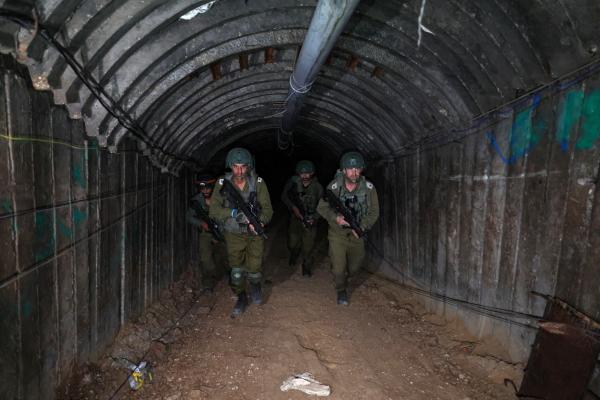
Brigadier General (Res.) Itai Brun will join Senior Fellow Dr. Michael Doran to examine the strategic, organizational, and analytical factors that enabled Hamas’s October 7 surprise attack.
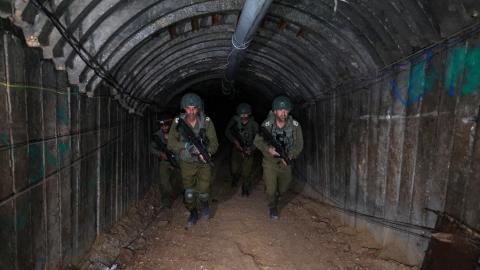
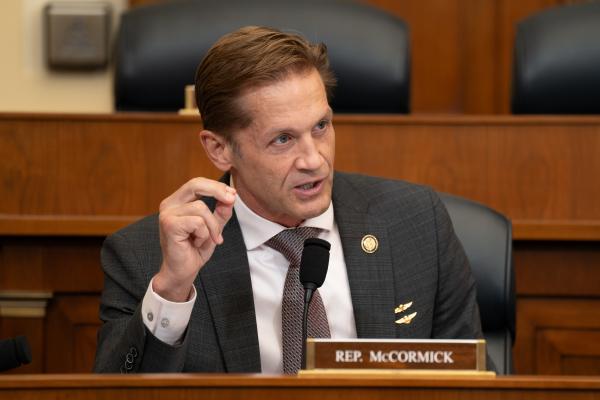
Senior Fellow Jason Hsu will host Congressman Rich McCormick (R-GA), a member of the House Armed Services Committee and Foreign Affairs Committee and a former member of the bipartisan Task Force on Artificial Intelligence, for a conversation on securing American AI leadership.
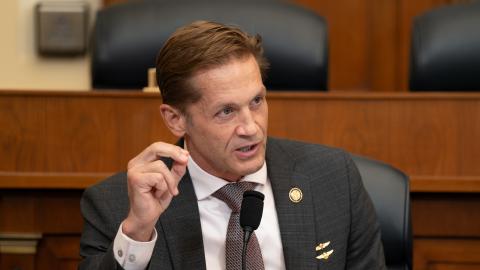
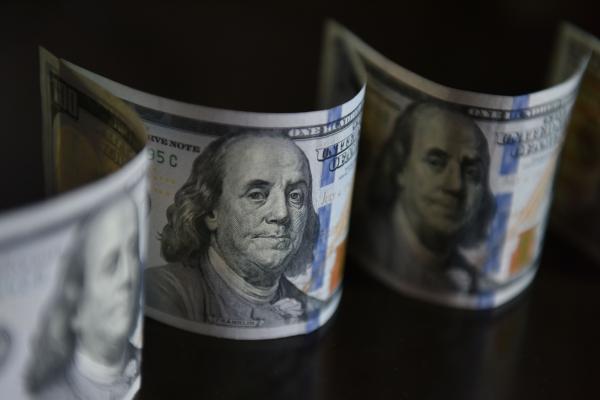
At Hudson, Senior Fellows Brendan Brown and Harold Furchtgott-Roth and Mises Institute Senior Fellow Alex Pollock will discuss the book’s findings and how gold-based monetary reform combined with the increased use of modern analytical tools can help end the inflationary spiral.
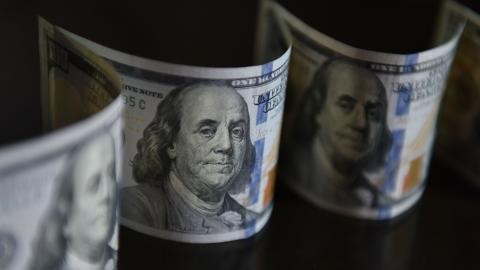

Join Senior Fellow Michael Sobolik and an expert panel for a discussion about a new report from Hong Kong Watch on the state of Hong Kong and how US policymakers can close the loopholes Beijing exploits.

